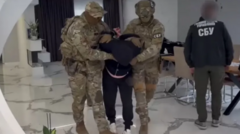As Russia marked the 80th anniversary of the Soviet victory over Nazi Germany, a spectacular military parade took center stage in Moscow, designed to evoke strong feelings of nationalism while making a statement to both allies and adversaries. On a crisp morning, over 180 pieces of military equipment, including the latest artillery systems and drones used in the ongoing conflict in Ukraine, paraded across Red Square. The event featured the participation of over 11,500 dressed service members, who celebrated with resounding chants of "Hurrah!" as they marched past the Kremlin. The highlight of the parade was an aerial display of bomber jets, painting the sky in Russia's national colors of red, white, and blue.
**Putin Leverages Historical Triumph for Modern Military Showcase**

**Putin Leverages Historical Triumph for Modern Military Showcase**
In a grand display on Red Square, the Russian president turned the spotlight on national pride while illustrating military prowess amid ongoing conflict.
The symbolic importance of this event cannot be overstated; it served both as a show of force and a reminder of Russia's historical narrative. Current military operations in Ukraine were intertwined with the proud legacy of the Soviet Union's victory in World War II—a narrative that has been pivotal in building national identity since the Soviet Union's dissolution in 1991. National pride was palpable as foreign dignitaries, such as Egypt’s foreign minister, commented on the impressive display, encapsulating the dual aspects of the parade: fostering unity internally and asserting power externally.
This event illustrates not only Russia's historical achievements but also its current military ambitions in the face of international scrutiny and ongoing warfare. The continuation of such traditions signals a resolve to reinforce national unity while showcasing military capabilities in an increasingly complex geopolitical landscape.
By linking past victories to contemporary military actions, the Kremlin aims to strengthen national pride amidst adversity, both domestically and on the international stage, leveraging the remnants of Soviet history in a modern context.
This event illustrates not only Russia's historical achievements but also its current military ambitions in the face of international scrutiny and ongoing warfare. The continuation of such traditions signals a resolve to reinforce national unity while showcasing military capabilities in an increasingly complex geopolitical landscape.
By linking past victories to contemporary military actions, the Kremlin aims to strengthen national pride amidst adversity, both domestically and on the international stage, leveraging the remnants of Soviet history in a modern context.





















